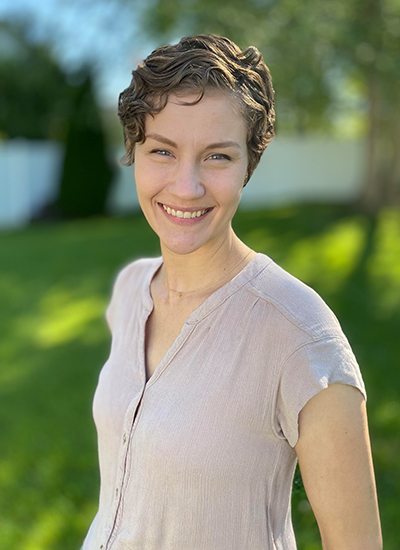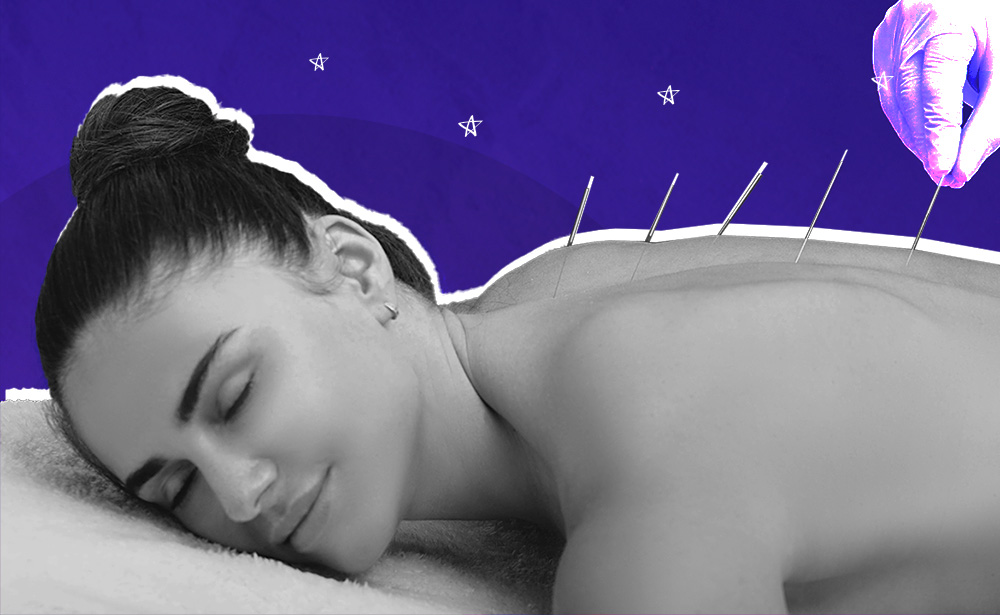
When you ponder different methods for better sleep, getting poked with needles may not seem like a great option. But some claim that acupuncture — an ancient Chinese practice — can help you sleep better and longer. (1)
During an acupuncture session, a licensed provider inserts very thin needles into the skin at specific points of your body, which may help you relax and de-stress. (2) But does acupuncture for sleep actually work? Read on to find out!
Note: The content on Sleepopolis is meant to be informative in nature, but it shouldn’t be taken as medical advice, and it shouldn’t take the place of medical advice and supervision from a trained professional. If you feel you may be suffering from any sleep disorder or medical condition, please see your healthcare provider immediately.
Long Story Short
- Acupuncture, an ancient Chinese practice, is done by inserting needles into specific points on your body.
- Some experts claim acupuncture can help you sleep better, longer, and can even improve symptoms of sleep disorders like insomnia, sleep apnea, and restless leg syndrome.
- You can also improve your sleep with good sleep hygiene practices, like avoiding screens before bed, making your bedroom cool and comfortable, and keeping a regular sleep schedule.
How Acupuncture Works
So, you want to know how the acupuncture sausage is made? First off, acupuncture needles are super tiny (not hollow like medical needles). (3) An acupuncturist places these needles into very specific “acupoints,” which are said to have different positive effects on the body. (3)
Traditional Chinese Medicine (TCM) practitioners claim acupuncture balances your qi (pronounced “chee”), which translates to “vital energy.” When your qi becomes balanced, TCM providers say your body can achieve maximum wellness. (3)
“Acupuncture works by tapping into the nervous system to elicit the rest and digest response (parasympathetic nervous system), which is the body’s natural healing ability,” says Tsao-Lin Moy, an experienced acupuncturist and Chinese Medicine practitioner.
What Is the Parasympathetic Nervous System?
Where your “fight or flight” response gives you a jolt of adrenaline to spring into action, your parasympathetic nervous system causes the opposite effect and allows your body to save up energy and relax. (4)
In an acupuncture session, your practitioner uses five to 20 stainless steel, sterilized, flexible needles that could be anywhere from 10 to 100 millimeters (mm) long, depending on which part of the body is targeted. You’ll feel a little pinch as they insert the needles into specific points, where they typically stay for 10 to 20 minutes. (3)
Can Acupuncture Help with Sleep?
“Yes, acupuncture can be an effective treatment for improving sleep quality and duration,” says Tom Ingegno, certified acupuncturist and lead clinician at Charm City Integrative Health.
“I like to think of [acupuncture] as a complementary treatment for anything related to sleep. And if somebody wants to try that, I don’t see a big downside.”
Dr. Audrey Wells, M.d.
It does this by balancing energy flow, reducing stress, and promoting relaxation, all of which have the potential to improve sleep, says Ingegno. “Research has shown that acupuncture can increase the production of neurotransmitters like serotonin and melatonin, which are essential for regulating sleep-wake cycles,” he adds.
“Acupuncture actually has some data now supporting the fact that it helps you with sleep quantity and sleep quality,” says Audrey Wells, M.D., sleep physician and founder of Super Sleep MD. (5)
Studies on acupuncture and sleep are ongoing, but a lot of older research was done on animals. Since human and rodent sleep look so different, experts want to see more human trials to confirm how well acupuncture works for sleep. (5) (6) (7)
“I also think there’s an element of relaxing and knowing you’re on the acupuncture table, presumably giving an opportunity for you to regulate your breathing, dial back your stress, and take a break out of your day,” says Wells. And the more you can lower your stress, the better you’ll sleep! (8)
Benefits of Acupuncture for Sleep
Pain and anxiety are important members of the “sleep stealers club” and some scientific evidence supports the suggestion that acupuncture can help with those symptoms. (2) (9)
One benefit to acupuncture over other sleep aids? It’s not a medication, so it can’t interfere with other treatments like a sleep medication might, says Moy.
“People often experience immediate relaxation in their body and will experience improved or restful sleep as fast as the same day and sometimes for several days,” says Moy, who adds the best results come from consistency in treatment.
“I like to think of [acupuncture] as a complementary treatment for anything related to sleep. And if somebody wants to try that, I don’t see a big downside,” says Wells.
Acupuncture Points for Sleep
“In traditional Chinese medicine, certain points, or acupoints, are believed to have specific effects on the body when stimulated,” says Ingegno. These points have some real “fun” names like HT7, SP6, and PC6, which are a few of the most common points used for sleep: (10)
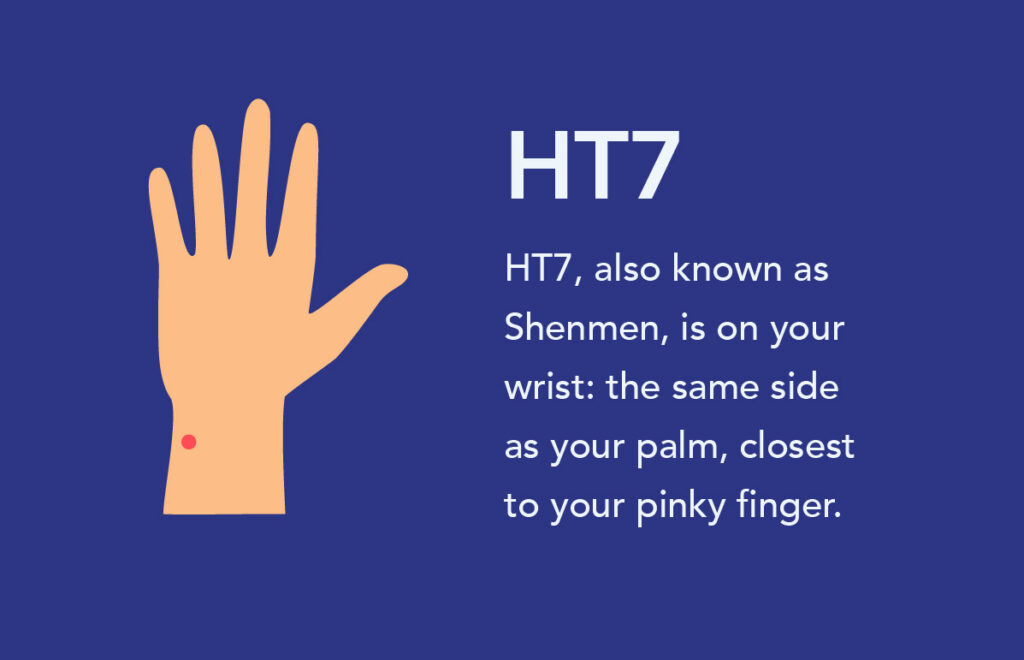
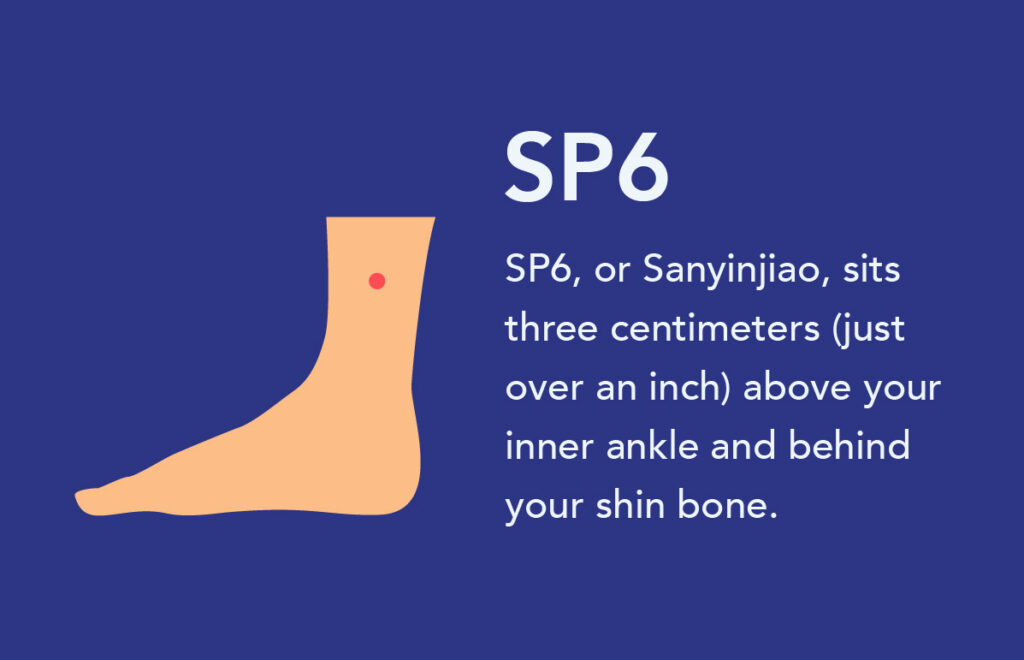
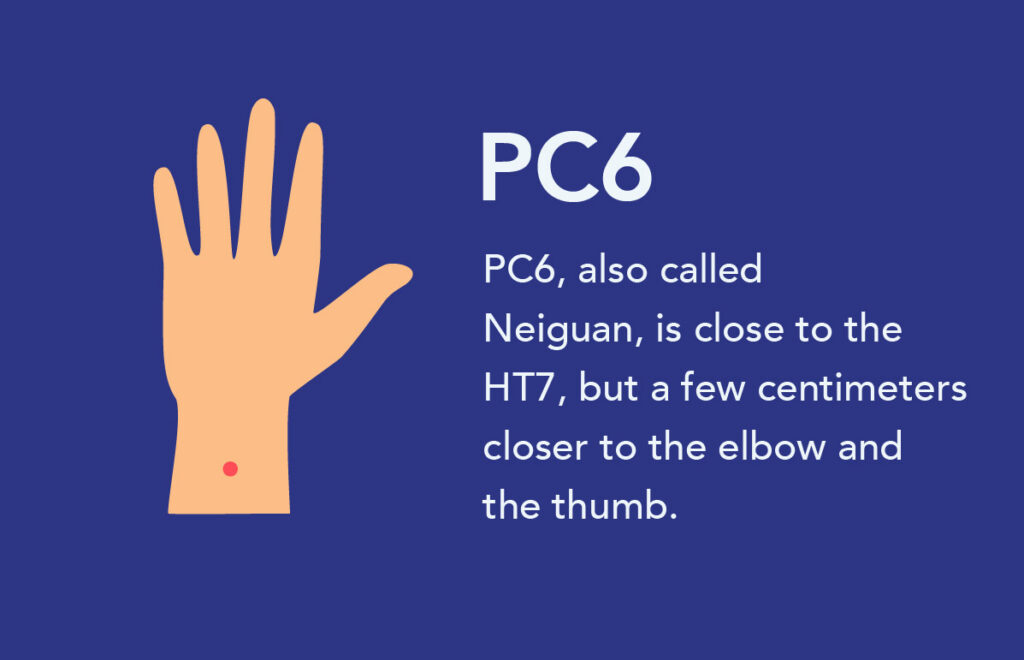
- HT7, also known as Shenmen, is on your wrist: the same side as your palm, closest to your pinky finger. (11) (12)
- SP6, or Sanyinjiao, sits three centimeters (just over an inch) above your inner ankle and behind your shin bone. (13)
- PC6, also called Neiguan, is close to the HT7, but a few centimeters closer to the elbow and the thumb. (12) (14)
HT7 and SP6 have shown an even better effect on sleep and daytime sleepiness when targeted together. (15)
Can Acupuncture Help with Insomnia and Other Sleep Disorders?
If acupuncture helps sleep by decreasing stress, you may wonder if it can help more complex sleep issues, like sleep disorders.
Acupuncture for Insomnia
Insomnia can describe several nights of bad sleep, but chronic insomnia means you don’t sleep well at least three nights a week for over three months. (16)
Stress can cause insomnia, but so can a disturbance in your brain’s messengers — neurotransmitters — which play a big role in your sleep-wake cycle. (17) (18)
The Sleep-Wake Cycle
Everyone has an internal clock called a circadian rhythm (your sleep-wake cycle) that helps your brain know when to wake up and when to sleep. (19)
“By reducing stress, calming the mind, and regulating neurotransmitters, acupuncture can help people with insomnia fall asleep faster and stay asleep longer,” says Ingegno. While existing research is limited, one small recent study agrees, finding that a majority of 30 people with chronic insomnia experienced improved sleep after acupuncture compared to the group that did not receive the procedure. (1)
Acupuncture for Sleep Apnea
When you have sleep apnea, your breathing pauses many times while you sleep, lowering your oxygen and disrupting your sleep through the night. (20)
“While more research is needed, some studies suggest that acupuncture may improve sleep quality and daytime functioning in people with sleep apnea,” says Ingegno.
In some research, people with sleep apnea who tried acupuncture experienced higher oxygen levels and better sleep, although one study suggested research methods have been very different between studies, and they need to see more research with standardized methods to agree with confidence. (21) (22)
Overall, sleep apnea is a sleep disorder with serious side effects when it isn’t treated properly, so be sure to make all of your treatment decisions in lockstep with your treating physician.
Acupuncture for Restless Leg Syndrome (RLS)
Restless leg syndrome (RLS) is a neurological disorder that causes an uncomfortable, crawling sensation in your legs that creates an overpowering urge to move them for relief. (23)
“RLS…disproportionately affects women and can get worse with age,” says Moy. When combined with other therapies, acupuncture showed a 48 percent cure rate vs a 22 percent cure rate in non-acupuncture treatment, Moy adds. The study review that provided these numbers reported many of the studies included were small and non-standardized, so more studies are needed to confirm their result. (24)
Other Common Reasons for Getting Acupuncture
What else can acupuncture do for you? According to Ingegno, it can help ease pain, anxiety, and other conditions.
Pain
In the United States, most people use acupuncture for pain relief, many of whom say it works well for acute pain. (2) (25) One study tested acupuncture against a placebo (a small needle prick to the spot vs needle insertion) and those who received true acupuncture reported more pain relief, which also improved sleep quality. (26)
Infertility
Studies on female fertility and acupuncture need some overhaul, with many of them out of date and using inconsistent methods of study and small groups of people. (27) But studies on male fertility show that acupuncture can help improve sperm concentration and mobility. (28)
Anxiety
Multiple studies show promising results when people with an anxiety disorder try acupuncture. (9) As with acupuncture for sleep, experts want to see more studies with larger sample sizes and high quality methodologies to confirm these results. (29)
Need to Knows Before Trying Acupuncture
If you’re still undecided on trying acupuncture, you may ask, “What’s the catch?” Experts report very few reasons to avoid the practice, even in kids, pregnant people, and anyone on blood-thinning medications. (3)
Because the needles are so thin, the risk of bleeding is very low, even on blood thinners. (3) If you are pregnant, however, always run any new treatment by your provider first; some experts report certain acupuncture points may cause premature labor. (30)
Your healthcare provider may ask you to delay acupuncture treatment if you have an infection, skin cancer, or low white blood cells — the cells that fight off infection in your body. (3) If you’re not sure, your provider can help you decide if acupuncture is right for you.
Related Treatments
Traditional Chinese Medicine has more to offer than just acupuncture. This medical approach includes several other healing techniques:
- Acupressure, also known as Chinese massage, focuses on the same pressure points as acupuncture, but instead of needles, those spots are pushed or rubbed. It may help with anxiety or other psychological disorders. (31)
- Reflexology practitioners claim they can help you relax and heal through pressure applied to certain points of the feet and hands. (32)
- Cupping is done by placing a cup on your skin and removing oxygen from the space inside, which creates a negative pressure, pulling the skin away from the body. Some claim cupping reduces pain, but studies are limited. (33)
- Ear seeding involves taping seeds to pressure points on your ears. Studies have suggested this technique may ease low back pain, menstrual cramps, anxiety, and stress. (34) (35) (36)
Finding a Licensed Practitioner
In the US, providers who offer acupuncture must earn credentials through the American Board of Medical Acupuncture and certification through the National Certification Commission for Acupuncture and Oriental Medicine. (3)
When searching for a clinical acupuncturist, you can ask about credentialing and certification, and some practitioners may have this information available on their website.
If you’re nervous about the procedure, you can ask to meet your acupuncturist first to make sure they’re a good fit. You can also ask about price, time expectations, and recommended frequency to figure out which provider will work best for your needs.
Other Sleep Tips
“Acupuncture is one way to naturally support well-being,” says Moy, “[But] the efficacy of results depends on also addressing underlying conditions that are the cause of sleep problems such as pain and inflammation.”
Moy says if you want better sleep, you also have to commit to good sleep hygiene, which means less screen time before bed, maintaining a healthy diet, including exercise in your day, and incorporating mindfulness and stress relief practices in your life.
Good sleep hygiene (and better sleep) also involves sticking to a regular bedtime, avoiding caffeine and alcohol before bed, skipping naps, and keeping your room cool, dark, and comfortable.
FAQs
How long does acupuncture take to work for insomnia?
“The number of acupuncture sessions needed to improve insomnia varies from person to person,” says Ingegno. “Some individuals may experience better sleep after just one or two sessions, while others may require several weeks of regular treatments to see significant improvements.”
How long is an acupuncture session?
In an acupuncture session, your practitioner will typically insert five to 20 stainless steel, sterilized, flexible needles, which stay in place for 10 to 20 minutes. (3)
The Last Word From Sleepopolis
Like Wells said, it’s hard to find a downside to acupuncture for sleep. If it works, great! If it doesn’t, well…you tried something new. If you’re looking for a place to start, ask friends or coworkers for an acupuncturist recommendation. You can even go with them and make an outing of it. As an alternative therapy, acupuncture may not cure all that ails you, but if your provider gives you the “all-clear,” you can go for it and see what happens.
Sources
- Liu C, Zhao Y, Qin S, Wang X, Jiang Y, Wu W. Randomized controlled trial of acupuncture for anxiety and depression in patients with chronic insomnia. Annals of Translational Medicine. 2021;9(18):1426-1426. doi:10.21037/atm-21-3845
- Acupuncture: What You Need To Know | NCCIH. Accessed May 6, 2024. https://www.nccih.nih.gov/health/acupuncture-what-you-need-to-know
- Acupuncture – StatPearls – NCBI Bookshelf. Accessed May 6, 2024. https://www.ncbi.nlm.nih.gov/books/NBK532287/
- Neuroanatomy, Parasympathetic Nervous System – StatPearls – NCBI Bookshelf. Accessed May 6, 2024. https://www.ncbi.nlm.nih.gov/books/NBK553141/
- Wu J, Zhao Z. Acupuncture in circadian rhythm sleep–wake disorders and its potential neurochemical mechanisms. Front Neurosci. 2024;18:1346635. doi:10.3389/fnins.2024.1346635
- Wang L, Wang R, Yao Y, Bai X, Sheng G. The effects of acupuncture on psychological symptoms in patients with insomnia: study protocol for a randomized controlled trial. Trials. 2022;23:152. doi:10.1186/s13063-022-06078-2
- Yang JL, Zhang R, Du L, Yang YS, Liu XC. [Clinical observation on the neurotransmitters regulation in patients of insomnia differentiated as yang deficiency pattern treated with warm acupuncture and auricular point sticking therapy]. Zhongguo Zhen Jiu. 2014;34(12):1165-1168.
- Alwhaibi M, Al Aloola NA. Associations between Stress, Anxiety, Depression and Sleep Quality among Healthcare Students. Journal of Clinical Medicine. 2023;12(13):4340. doi:10.3390/jcm12134340
- Yang X yun, Yang N bo, Huang F fang, Ren S, Li Z jiang. Effectiveness of acupuncture on anxiety disorder: a systematic review and meta-analysis of randomised controlled trials. Annals of General Psychiatry. 2021;20(1):9. doi:10.1186/s12991-021-00327-5
- Lin CH, Lin YH, Tzeng IS, Kuo CY. An Association Rule Analysis of the Acupressure Effect on Sleep Quality. Evid Based Complement Alternat Med. 2021;2021:1399258. doi:10.1155/2021/1399258
- Son CG. Clinical application of single acupoint (HT7). Integr Med Res. 2019;8(4):227-228. doi:10.1016/j.imr.2019.08.005
- Han Q, Hou XS, Cheng L, Meng X, Xie Q, Zhao JP. [Acupoint selection rules and characteristics of insomnia in the elderly treated with acupuncture]. Zhongguo Zhen Jiu. 2021;41(12):1405-1408. doi:10.13703/j.0255-2930.20200904-k0002
- Madmoli Y, Rokhafroz D, Zarea K, Maraghi E. Effects of SP6 and ST36 Acupressure on Pain and Physiological Indexes in Addicted Men: A Single-Blind Randomized Clinical Trial. Addict Health. 2022;14(1):52-61. doi:10.22122/ahj.v14i1.1251
- Yang J, Jiang Y, Chen Y, et al. Acupressure the PC6 point for alleviating postoperative nausea and vomiting. Medicine (Baltimore). 2019;98(33):e16857. doi:10.1097/MD.0000000000016857
- Song XJ, Zhu YH, Wu P, Du L, Li ZW. [Acupoint compatibility effect and mechanism of Shenmen (HT7) and Sanyinjiao (SP6) in improving daytime fatigue and sleepiness of insomnia]. Zhen Ci Yan Jiu. 2022;47(7):630-635. doi:10.13702/j.1000-0607.20210590
- Insomnia – What Is Insomnia? | NHLBI, NIH. Accessed September 14, 2023. https://www.nhlbi.nih.gov/health/insomnia
- Insomnia – Causes and Risk Factors | NHLBI, NIH. Accessed September 14, 2023. https://www.nhlbi.nih.gov/health/insomnia/causes
- Kaczmarski P, Sochal M, Strzelecki D, Białasiewicz P, Gabryelska A. Influence of glutamatergic and GABAergic neurotransmission on obstructive sleep apnea. Front Neurosci. 2023;17:1213971. doi:10.3389/fnins.2023.1213971
- Physiology, Circadian Rhythm – StatPearls – NCBI Bookshelf. Accessed January 14, 2024. https://www.ncbi.nlm.nih.gov/books/NBK519507/
- Sleep Apnea – What Is Sleep Apnea? | NHLBI, NIH. Accessed November 20, 2023. https://www.nhlbi.nih.gov/health/sleep-apnea
- Wang L, Xu J, Zhan Y, Pei J. Acupuncture for Obstructive Sleep Apnea (OSA) in Adults: A Systematic Review and Meta-Analysis. BioMed Research International. 2020;2020:e6972327. doi:10.1155/2020/6972327
- Lin J, Kong Y, Chen H, et al. Effects of acupuncture on obstructive sleep apnea–hypopnea syndrome: A meta-analysis. Research in Nursing & Health. 2023;46(2):220-235. doi:10.1002/nur.22302
- Restless Legs Syndrome | National Institute of Neurological Disorders and Stroke. Accessed September 14, 2023. https://www.ninds.nih.gov/health-information/disorders/restless-legs-syndrome
- Huang C, Tang JF, Sun W, Wang LZ, Jin YS. Effectiveness of acupuncture in the management of restless leg syndrome: a systematic review and meta-analysis. Ann Palliat Med. 2021;10(10):10495-10505. doi:10.21037/apm-21-2309
- Nielsen A, Dusek JA, Taylor-Swanson L, Tick H. Acupuncture Therapy as an Evidence-Based Nonpharmacologic Strategy for Comprehensive Acute Pain Care: The Academic Consortium Pain Task Force White Paper Update. Pain Med. 2022;23(9):1582-1612. doi:10.1093/pm/pnac056
- Allen J, Mak SS, Begashaw M, et al. Use of Acupuncture for Adult Health Conditions, 2013 to 2021. JAMA Netw Open. 2022;5(11):e2243665. doi:10.1001/jamanetworkopen.2022.43665
- Quan K, Yu C, Wen X, Lin Q, Wang N, Ma H. Acupuncture as Treatment for Female Infertility: A Systematic Review and Meta-Analysis of Randomized Controlled Trials. Evidence-Based Complementary and Alternative Medicine. 2022;2022:e3595033. doi:10.1155/2022/3595033
- Feng J, He H, Wang Y, et al. The efficacy and mechanism of acupuncture in the treatment of male infertility: A literature review. Front Endocrinol. 2022;13. doi:10.3389/fendo.2022.1009537
- Li M, Liu X, Ye X, Zhuang L. Efficacy of acupuncture for generalized anxiety disorder: A PRISMA-compliant systematic review and meta-analysis. Medicine. 2022;101(49):e30076. doi:10.1097/MD.0000000000030076
- Acupuncture – Mayo Clinic. Accessed May 6, 2024. https://www.mayoclinic.org/tests-procedures/acupuncture/about/pac-20392763
- Yang J, Do A, Mallory MJ, Wahner-Roedler DL, Chon TY, Bauer BA. Acupressure: An Effective and Feasible Alternative Treatment for Anxiety During the COVID-19 Pandemic. Glob Adv Health Med. 2021;10:21649561211058076. doi:10.1177/21649561211058076
- Reflexology | NCCIH. Accessed May 6, 2024. https://www.nccih.nih.gov/health/reflexology
- Cupping | NCCIH. Accessed May 6, 2024. https://www.nccih.nih.gov/health/cupping
- Ear Seeds: What Are They and Do They Work? Accessed May 6, 2024. https://health.clevelandclinic.org/ear-seeds
- Liu M, Tong Y, Chai L, et al. Effects of Auricular Point Acupressure on Pain Relief: A Systematic Review. Pain Manag Nurs. 2021;22(3):268-280. doi:10.1016/j.pmn.2020.07.007
- Munhoz OL, Morais BX, dos Santos WM, de Paula CC, Magnago TSB de S. Effectiveness of auriculotherapy for anxiety, stress or burnout in health professionals: a network meta-analysis. Rev Lat Am Enfermagem. 30:e3708. doi:10.1590/1518-8345.6219.3708
Wells, Audrey, MD. Personal Interview. April 30, 2024.
Ingegno, Tom. Personal Interview. April 28, 2024.
Moy, Tsao-Lin. Personal Interview. April 29, 2024.



























